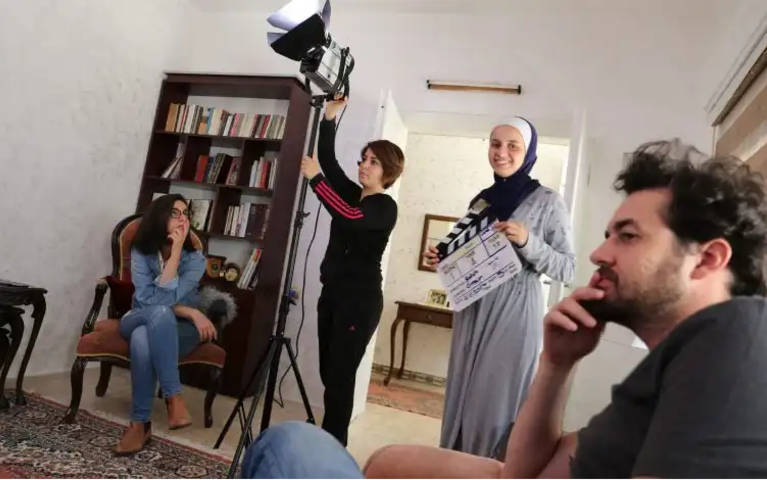Caramel by Nadine Labaki

Directed by: Nadine Labaki
Produced by: Anne-Dominique Toussaint
Screenplay by: Nadine Labaki, Rodney El Haddad, Jihad Hojeily
Starring: Nadine Labaki, Adel Karam, Yasmine Al Masri, Joanna Moukarzel, Gisele Aouad, Dimitri Staneofski, Sihame Haddad, Aziza Semaan, Fadia Stella, Fatmeh Safa Music by: Khaled Mouzanar Cinematography: Yves Sehnaoui
Country: Lebanon
Language: Arabic, French
Running Time: 96 minutes
Located in a Beirut that is not politically charged nor dominated by pocked buildings, “Caramel” – or “Sukkar Banat” in Arabic – revolves around the lives of five women working in a beauty salon.
The title of the film refers to a blend of sugar, lemon juice, and water that is made into a paste and used by Arab women as a traditional depilation method. An old clothes shop in the Gemmayzeh area was transformed into the salon where the filming took place. With the help of nonprofessional actors, Labaki manages to form a visceral portrayal of a group of friends, each of them confronting different societal pressures that cause tension, guilt, and fear in their everyday lives as they struggle to find their small portion of happiness in Beirut.
The characters face social issues that are quint essential in today’s Lebanon, but which society marks as taboo, yet in the film they are tackled in a non-provocative lens. One character, Nisrine, is a Muslim woman about to get married, but her husband-to-be is unaware that she is not a virgin. Layal still lives with her parents like other unmarried women in the city, but is having an affair with a married man. Rima’s character is a tomboy who struggles with her feelings for a female client; while Jamale – who is going through menopause – goes out of her way to prove she is still young.
Writer and director Nadine Labaki does a fine job orchestrating the interaction between these women and their responses to relationships and their bodies. The story conveys human emotion in a most sensitive sense, yet ends with an empowering message, not only for women, but for all repressed individuals in society, encouraging them to take action.
The shooting of “Caramel” ended just nine days before the Israel-Lebanon war erupted in July 2006, and premiered at the Directors’ Fortnight at the Cannes Film Festival in May 2007, exactly one year after the shooting began. It was a commercial success in the summer of that same year; it was shown in Lebanon to packed theatres, selling worldwide and collecting important prizes at many festivals around the world, garnering Labaki much acclaim both as a director and actress, and putting her on Variety’s 10 Directors to Watch List at the Sundance Film Festival.
“Peaceful coexistence among the sects is apparent (in the movie) but it was unintentional. This is how I see Lebanon. We are a people from a number of sects who live together in a very natural way,” Labaki said.
Born in Lebanon 18th of February 1974, Nadine Labaki is a director and actress known for tearing down stereotypes, and touching on fundamental issues like religion and the role of women in society in humorous and poetic ways. She started her commercial film success in 2005, when she took part in the Cannes Film Festival Residence in order to write “Caramel”.
Labaki went on to direct another feature-length narrative “Where Do We Go Now?”, which premiered during the 2011 Cannes Film Festival as part of Un Certain Regard. Her distinctive visual style earned her worldly recognition and led her to win the Jury Award in Cannes 2018, for her latest film “Capharnaüm”, becoming the first Arab female director to win this award.















